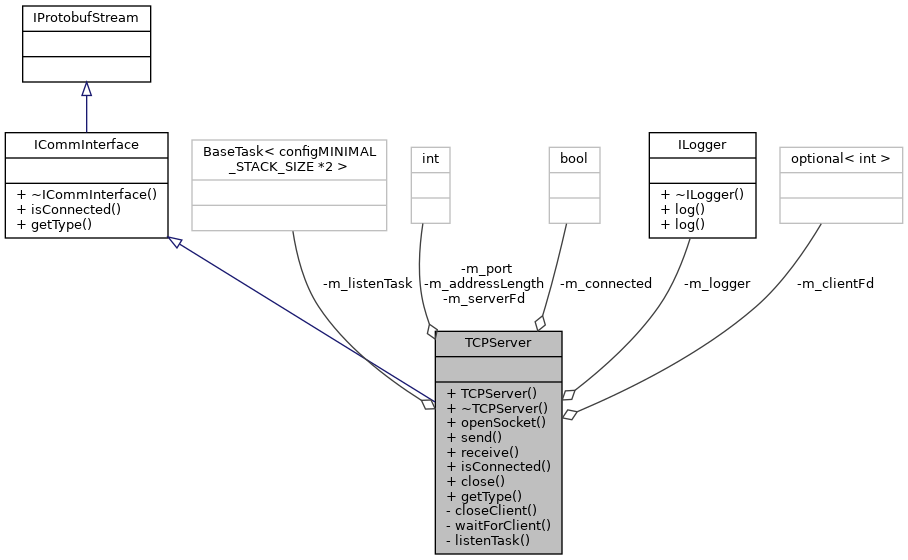#include <TCPServer.h>
Inheritance diagram for TCPServer:

Collaboration diagram for TCPServer:

Classes | |
| struct | m_address |
Public Member Functions | |
| TCPServer (ILogger &logger) | |
| ~TCPServer () override | |
| bool | openSocket (int port) |
| opens the socket on a certain port More... | |
| bool | send (const uint8_t *buffer, uint16_t length) override |
| bool | receive (uint8_t *buffer, uint16_t length) override |
| bool | isConnected () const override |
| Tells if interface is connected and functionning. More... | |
| void | close () |
| ConnectionType | getType () const override |
| Tells the type of the connection interface. More... | |
 Public Member Functions inherited from ICommInterface Public Member Functions inherited from ICommInterface | |
| virtual | ~ICommInterface ()=default |
Private Member Functions | |
| void | closeClient () |
| void | waitForClient () |
Static Private Member Functions | |
| static void | listenTask (void *param) |
Private Attributes | |
| ILogger & | m_logger |
| bool | m_connected |
| BaseTask< configMINIMAL_STACK_SIZE *2 > | m_listenTask |
| int | m_serverFd {} |
| int | m_port |
| std::optional< int > | m_clientFd |
| int | m_addressLength {} |
Constructor & Destructor Documentation
◆ TCPServer()
| TCPServer::TCPServer | ( | ILogger & | logger | ) |
◆ ~TCPServer()
|
override |
Here is the call graph for this function:

Member Function Documentation
◆ close()
| void TCPServer::close | ( | ) |
Here is the call graph for this function:

Here is the caller graph for this function:

◆ closeClient()
|
private |
Here is the call graph for this function:

Here is the caller graph for this function:

◆ getType()
|
overridevirtual |
Tells the type of the connection interface.
- Returns
- the type of connection
Implements ICommInterface.
◆ isConnected()
|
overridevirtual |
Tells if interface is connected and functionning.
- Returns
- true if connected, false otherwise
Implements ICommInterface.
◆ listenTask()
|
staticprivate |
Here is the call graph for this function:

◆ openSocket()
| bool TCPServer::openSocket | ( | int | port | ) |
opens the socket on a certain port
- Returns
- true if the socket could be opened, binded and then listen to the port, false if not
Here is the call graph for this function:

Here is the caller graph for this function:

◆ receive()
|
override |
◆ send()
|
override |
◆ waitForClient()
|
private |
Here is the call graph for this function:

Here is the caller graph for this function:

Member Data Documentation
◆ m_addressLength
|
private |
◆ m_clientFd
|
private |
◆ m_connected
|
private |
◆ m_listenTask
|
private |
◆ m_logger
|
private |
◆ m_port
|
private |
◆ m_serverFd
|
private |
The documentation for this class was generated from the following files:
- src/bsp/src/posix/include/TCPServer.h
- src/bsp/src/posix/src/TCPServer.cpp
 1.8.17
1.8.17